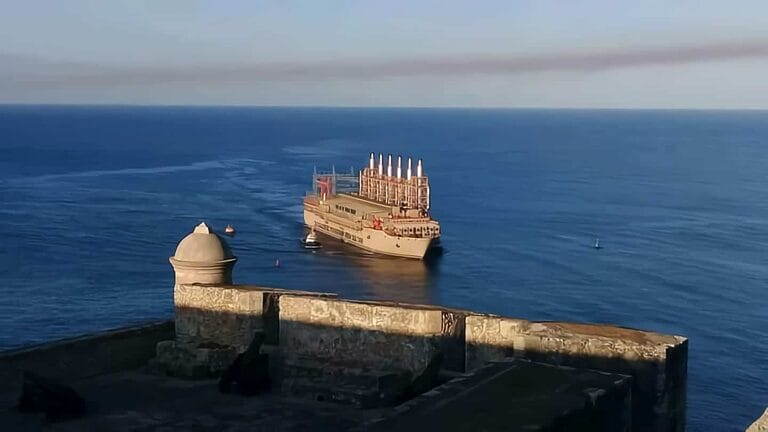The energy crisis in Cuba, with blackouts of more than 12 hours in some provinces of the country, is at its most critical point, with daily deficits exceeding 1000 MW. Hence, Cubans are asking themselves, where are the Turkish patanas that promised relief?
The Turkish electric barges, announced as the panacea for Cuba's energy crisis, have failed to meet expectations. Despite projections estimating their contribution between 18 and 20 percent of the national electricity generation in 2023, their actual impact has been modest, and the island continues to suffer very long blackouts with no solution in sight.
Sabemos que desde mediados In April, a Turkish barge, one of the six that were on the island, left the country to move to Guyana, according to local media. This nation was experiencing major blackouts, and it called through a contract and payments for one of the Turkish barges, which is already supplying energy to the country.
Este buque inyecta aproximadamente 36 megavatios de electricidad a la red nacional y es un alivio significativo. Y estará allí durante dos años. Pero, ¿qué pasa con el resto de las patanas turcas que prometían un alivio en medio de la crisis energética cubana?
Crisis energética en Cuba y las patanas turcas
Según una investigación de Martí News, no hay transparencia desde el gobierno sobre el contrato entre la empresa turca Karadeniz Holding y las autoridades cubanas, que ofrecieron a las «patanas turcas» como la solución temporal a largo plazo de este déficit constante.
Cuba pagó por estos buques, aunque no estuvieran generando electricidad al país, y se comprometió a suministrarles el combustible, pero NO tienen combustible. La duración del contrato, según el último acuerdo de 2021, se extendió por 18 años, pero si no hay combustible, y la crisis energética perdura, ¿para qué el gasto enorme con las patanas turcas?
In February of this year, these barges were off without fuel. A recent report indicated that the five are distributed as follows: two supporting the Mariel development zone, two in the port of Havana, and one in Santiago de Cuba.

Es atomico
This is f***ed up here, when there is a truck there is no fuel to put in it, and when there is fuel and a truck there is no flour to make the bread???
a contract for 18 years, whether they generate electricity or not, since it is clear that resolving the energy problem and the poor conditions this creates for the people does not matter, whoever signed that contract must have pockets full of the commissions it brings them, with that 18 years' worth of money parks with photovoltaic cells could be built to alleviate the annoying blackouts and even new thermoelectric plants could be built in the country, but no one cared or cares about solving the current situation, while the children of the leaders migrate to other countries and live luxurious million-dollar lifestyles.
The lack of electricity in Cuba has become a method or a practice, we get used to covering up blackouts for the people, since the people complain but do not act, so there is comfort for those who have to solve things. It is said "we do maintenance so that there is no power in the summer, but the power has to be daily and every month, or for a period, who is that shouted at?
The ones responsible for the town either lacking electricity or having power outages are the state, and it fails to solve the problem. The lack of electricity in Cuba has already become a method and a practice.